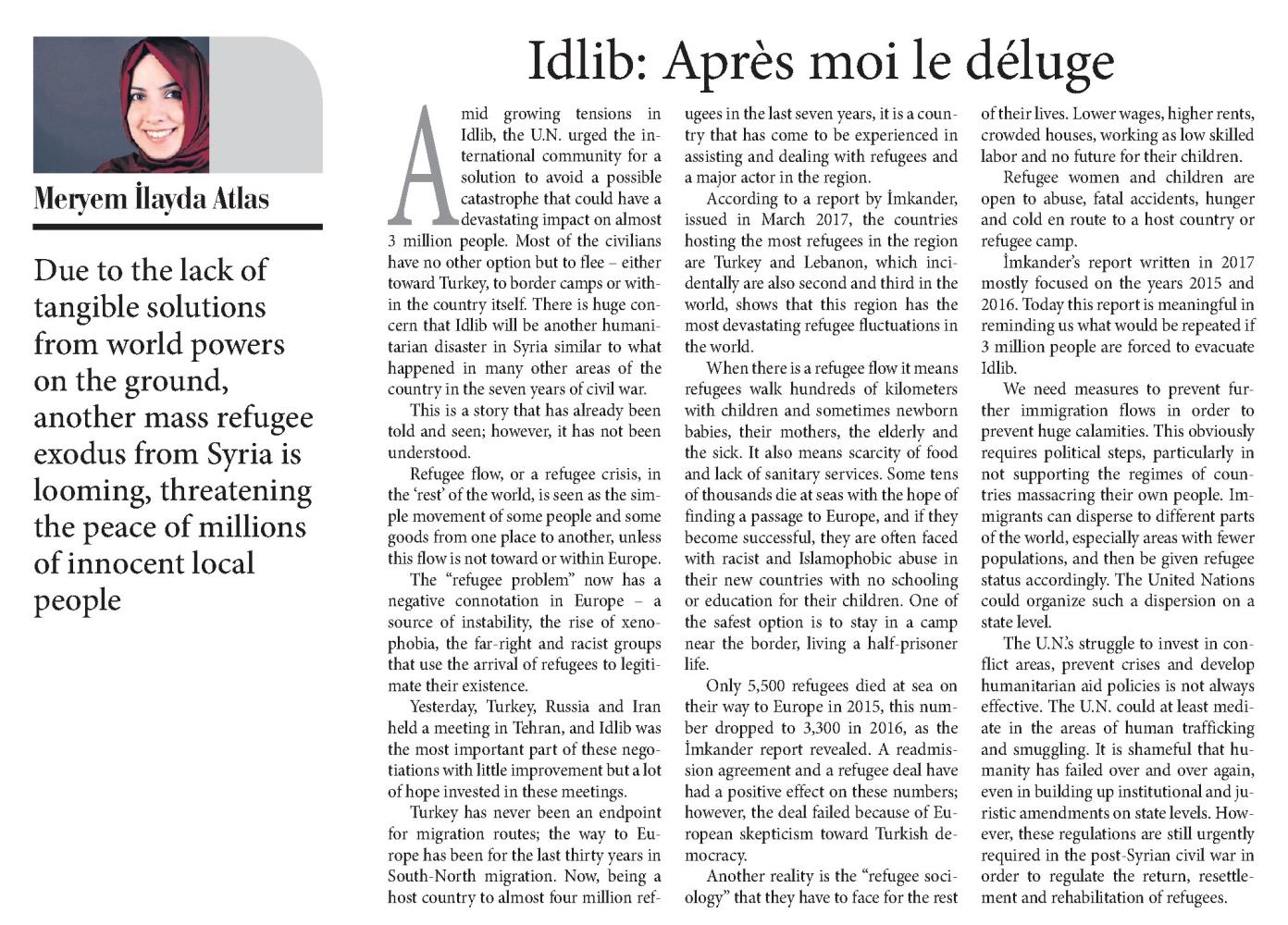Amid growing tensions in Idlib, the U.N. urged the international community for a solution to avoid a possible catastrophe that could have a devastating impact on almost 3 million people. Most of the civilians have no other option but to flee – either toward Turkey, to border camps or within the country itself. There is huge concern that Idlib will be another humanitarian disaster in Syria similar to what happened in many other areas of the country in the seven years of civil war. This is a story that has already been told and seen; however, it has not been understood.
Refugee flow, or a refugee crisis, in the 'rest' of the world, is seen as the simple movement of some people and some goods from one place to another, unless this flow is not toward or within Europe.
The "refugee problem" now has a negative connotation in Europe – a source of instability, the rise of xenophobia, the far-right and racist groups that use the arrival of refugees to legitimate their existence.
Yesterday, Turkey, Russia and Iran held a meeting in Tehran, and Idlib was the most important part of these negotiations with little improvement but a lot of hope invested in these meetings.
Turkey has never been an endpoint for migration routes; the way to Europe has been for the last thirty years in South-North migration. Now, being a host country to almost four million refugees in the last seven years, it is a country that has come to be experienced in assisting and dealing with refugees and a major actor in the region.
According to a report by İmkander, issued in March 2017, the countries hosting the most refugees in the region are Turkey and Lebanon, which incidentally are also second and third in the world, shows that this region has the most devastating refugee fluctuations in the world.
When there is a refugee flow it means refugees walk hundreds of kilometers with children and sometimes newborn babies, their mothers, the elderly and the sick. It also means scarcity of food and lack of sanitary services. Some tens of thousands die at seas with the hope of finding a passage to Europe, and if they become successful, they are often faced with racist and Islamophobic abuse in their new countries with no schooling or education for their children. One of the safest option is to stay in a camp near the border, living a half-prisoner life.
Only 5,500 refugees died at sea on their way to Europe in 2015, this number dropped to 3,300 in 2016, as the İmkander report revealed. A readmission agreement and a refugee deal have had a positive effect on these numbers; however, the deal failed because of European skepticism toward Turkish democracy.Another reality is the "refugee sociology" that they have to face for the rest of their lives. Lower wages, higher rents, crowded houses, working as low skilled labor and no future for their children.
Refugee women and children are open to abuse, fatal accidents, hunger and cold en route to a host country or refugee camp.
İmkander's report written in 2017 mostly focused on the years 2015 and 2016. Today this report is meaningful in reminding us what would be repeated if 3 million people are forced to evacuate Idlib.
We need measures to prevent further immigration flows in order to prevent huge calamities. This obviously requires political steps, particularly in not supporting the regimes of countries massacring their own people. Immigrants can disperse to different parts of the world, especially areas with fewer populations, and then be given refugee status accordingly. The United Nations could organize such a dispersion on a state level.
The U.N.'s struggle to invest in conflict areas, prevent crises and develop humanitarian aid policies is not always effective. The U.N. could at least mediate in the areas of human trafficking and smuggling. It is shameful that humanity has failed over and over again, even in building up institutional and juristic amendments on state levels. However, these regulations are still urgently required in the post-Syrian civil war in order to regulate the return, resettlement and rehabilitation of refugees.

DAILY SABAH - Meryem İlayda ATLAS (7/9/18)








